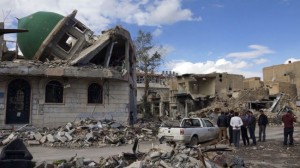 TEHRAN (FNA)- The miscalculations in Iraq and Afghanistan hang in the air as US weigh up whether to attack Syria. Of course, no situation is ever quite the same, and in this case the president is not urging a full-fledged invasion, just air and naval attacks. But after more than a decade of inconclusive war in the region, comparisons are inevitable.
TEHRAN (FNA)- The miscalculations in Iraq and Afghanistan hang in the air as US weigh up whether to attack Syria. Of course, no situation is ever quite the same, and in this case the president is not urging a full-fledged invasion, just air and naval attacks. But after more than a decade of inconclusive war in the region, comparisons are inevitable.The danger of being sucked into a ground war is one of the lessons from Iraq and Afghanistan. But there are equally important lessons about costs, which we would do well to heed.
In the run-up to the US invasion of Iraq, the Bush administration deliberately refused to consider the potential expense. Dick Cheney, Donald Rumsfeld and Mitch Daniels (head of the Office of Management and Budget) insisted that the war would be quick and cheap � perhaps costing $60 billion.
Larry Lindsey, the top economic advisor to President Bush, was fired for suggesting that the invasion might cost up to $200 billion. Lindsey later wrote a book attributing many of the subsequent mistakes in Iraq to the administration�s unwillingness to think about costs from the outset.
Here are four lessons from those conflicts which can dissuade American officials from beginning another war in the Middle East:
1. The costs go on long after combat phase is finished.
Even short conflicts have long term costs. The 1991 (Persian) Gulf War lasted for six weeks and our coalition allies paid for the combat phase. But the US now spends $4 billion per year paying disability benefits to veterans of that conflict, many of whom suffer from conditions related to �(Persian) Gulf War Syndrome.� Historically, the bill for veteran�s war costs always has come due 30 to 40 years later. The peak year for paying disability compensation to World War I veterans was in 1969. The largest expenditures for World War II veterans were in the 1980s. Payments to Vietnam veterans are still climbing.
Future expenditures will be even higher for those who fought in Iraq and Afghanistan, due to much higher survival rates, more generous benefits, and new, expensive medical treatments. The Department of Veterans Affairs has already treated more than 800,000 veterans from these conflicts, the majority of whom qualify for disability compensation for the rest of their lives. The bill for disability benefits, medical care, and Social Security Disability Insurance to these veterans will add another $900 billion to the cost of the Iraq and Afghanistan era.
2. This war can worsen economic crisis.
The trillions of dollars spent to date for Iraq and Afghanistan have been plunked on the national credit card. How is this possible?
Starting with the initial invasion of Afghanistan in 2001, the Bush administration requested, and Congress appropriated so-called �emergency supplemental� funds for war operations. (Such funding is typically reserved for natural disasters like hurricanes.) The designation allowed us to bypass all regular spending caps. This turned out to be an irresistible strategy. Over the next decade, Congress enacted the majority of war spending in 37 more �emergency supplemental� bills. This spending spree was accompanied by major tax cuts in 2001 and 2003 � thereby adding another $2 trillion onto the national debt.
The war debt sharply constrained our flexibility in responding to the 2008 financial crisis, contributing to a stimulus package that was too small and a protracted recession � with the accompanying budget battles, fiscal cliffs, sequestration and government-closure threats.
3. The costs of war are unpredictable.
The Iraq War cost far more than originally estimated � and it also set off a chain of events that had far-reaching economic consequences.
Last month, Baron Alan West, the former head of Britain�s Royal Navy, argued in the House of Lords, �There is no doubt that prime ministers and presidents think they can have clinical little military strikes and keep control of things, but you cannot. Once you start these things there is the law of unintended consequences.�
One of the unintended consequences of the US invasion of Iraq was the impact on oil prices, which spiked from $25 a barrel in 2003 (where the price had remained stable for two decades) to a peak of $140 in 2008. Since then they have rarely dipped below $100.
4. The US does a poor job of war accounting.
The US lacks the basic accounting systems necessary to understand and analyze where and how money is spent. In Iraq and Afghanistan, weak spending controls resulted in rampant waste, fraud, profiteering, mismanagement, and co-mingling of war and non-war related funds.
The special inspector general for Iraqi reconstruction estimated that $8 billion of the $60 billion appropriated for reconstruction was entirely wasted.
The Pentagon�s accounting system is so flawed that there is no way even to perform an audit. Indeed, officials admit they have �lost visibility� on tens of billions of dollars.
The Government Accountability Office, the Congressional Research Service, the Congressional Budget Office, Pentagon inspectors general, and others have repeatedly said that we don�t even know how much we spent on these wars.
We also do not account for the value of lives lost, or the future value of deferred benefits owed to veterans.
The economic lessons from 12 years in Iraq and Afghanistan are that we underestimated the costs, borrowed all the money to pay for them, and failed to account for where it was all spent.
By Fars News Agency
The Iran Project is not responsible for the content of quoted articles.










